Looking for unlimited cloud storage? With all the options on the market today and a lot of technical terms being thrown around, choosing the right cloud storage provider can seem like an overwhelming task.
To clear things up, I’ve compiled a list of the best unlimited cloud storage options on the market right now. Read on to find an unlimited cloud storage solution that best fits your needs and your budget.
TL:DR: Given all the options on the market today, the biggest question for anyone looking for unlimited cloud storage space is cost vs. performance. All the options on my list guarantee great value for your money, and each has its own unique features and areas of strength.
Coming in at number one is Sync.com, whose unlimited storage plan offers the best balance of performance and security features for your money. Box.com is a close second, offering similar performance at a slightly higher price.
For photo and video storage, Google Photos ranks number one on my list. Although it technically only offers unlimited storage for users of Google Pixel phones, it offers a whopping 2TB of storage space for only $9.99/month.
What’s the Best Unlimited Cloud Storage for Files and Documents?
Here’s a quick unlimited cloud storage comparison:
| Service | Storage Space | Pricing |
|---|---|---|
| Sync.com (Teams Unlimited Plan) | 1TB – Unlimited | $15/month |
| Box.com (Business Plans) | 100GB – Unlimited | $35/month |
| Dropbox Business (Advanced Plan) | 3TB – Unlimited | $75/month |
| OpenDrive (Personal Plan) | 500GB – Unlimited | $9.95/month |
1. Sync.com (Teams Unlimited Plan)
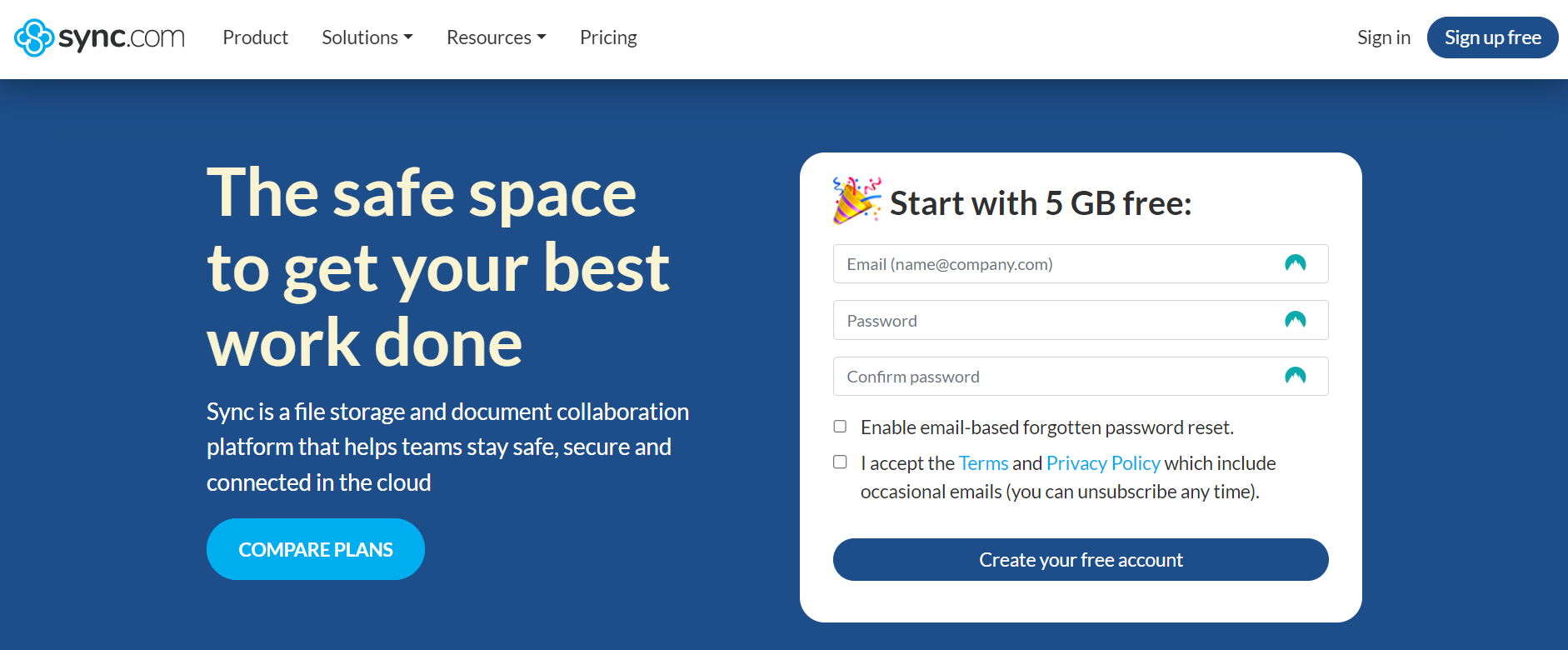
If you’re looking for unlimited cloud storage, Sync’s Teams Unlimited Plan offers unbeatable security and collaboration features at a very reasonable price, which is why it’s at the top of my list for 2025.
Sync Pros
- 5 Gigabytes of free storage
- Unbeatable security features
- Very reasonable prices (from $8/month)
- File-sharing and collaboration tools
- SOC-2, GDPR, and HIPAA compliant
- Microsoft Office365 integration
- 365-day files recovery
- Automatic camera photos and video uploading
Sync Cons
- Confusing pricing tiers
- A bit slow syncing compared to competitors

Sync’s Teams Unlimited Plan costs $15/month per user. However, there’s no option to be billed monthly, so when you sign up, you’ll be paying a minimum of $360 (the cost for the minimum number of 2 users, which technically means the monthly cost is actually $30).
A bit confusing, right? Even though the lack of a monthly payment option may be a little annoying for some, it’s still a very good price for all the great features the Teams Plan comes with.
One of the Teams Unlimited Plan’s most unique features is its file recovery, which allows users to access past and/or deleted versions of uploaded files for a full 365 days.
That’s right – a whole year. What this means is that if you accidentally deleted something or fell victim to a ransomware attack, you don’t have to worry: you have nearly a whole year to restore any files that got lost. This peace of mind is invaluable, particularly for companies dealing with large amounts of potentially sensitive data.
When it comes to cloud storage, user management is one of the most important features for businesses, and Sync makes it easy. It offers a ton of great productivity features, including the ability to manage who can access files by folder or by the user. There’s even an option to remotely lock specific devices out if anything should go wrong.
One feature that really sets Sync apart from the competition is the ability it gives you to preview documents directly in the app, which is unusual for end-to-end encrypted cloud storage services.
Sync is also integrated with Office365, which means users can easily edit files without having to download them.
In my opinion, Sync is the best-unlimited cloud storage for files and photos. For even more on what Sync is capable of, check out my comprehensive Sync review here.
Reliable, end-to-end encrypted cloud storage solution trusted by over 1.8 million businesses and individuals globally. Enjoy excellent sharing and team collaboration features and zero-knowledge privacy and security.
2. Box.com Business Plans

Box.com offers unlimited cloud storage specifically geared toward businesses.
Box.com Pros
- 5 Gigabytes of free storage
- Simple, user-friendly interface
- Very solid security features
- Supports SSO and MFA
- All business plans offer unlimited space
- Tons of third-party integrations, including Microsoft 365, Google Workspace, and Slack
Box.com Cons
- The file size is limited for uploads
- Expensive business plans (unlimited storage)
- Zero-knowledge encryption is only available at an added cost
Because Box was designed primarily with businesses in mind, all of its business plans come with unlimited storage.
Prices for the Business Plan start at $15/month per user (with a minimum of 3 users, meaning the real cost is $45/month). Their most popular option, the Business Plus plan, costs $25/month per user and comes with unlimited external collaboration and access to 10 additional enterprise app integrations.

Perhaps the biggest setback across all of Box’s tiers is its limited file upload size. The Business Plan limits file uploads to 5 GB, and the Business Plus Plan limits it to 15 GB. Their most comprehensive plan with a listed price is their Enterprise Plan ($35/month per user), and even this plan limits your file upload size to 50 GB. If you need more, their new Enterprise Plus plan offers 150 GB file uploads, but this requires you to contact Box.com for a custom quote.
Like Sync, Box.com also offers version history, but it’s not as long as Sync’s (maximum 100 days with the Enterprise Plan).
When it comes to third-party integration, Box.com has most of the competition beat. It integrates with Office365, Google Workspace, Zoom, and Slack, which offers major opportunities for collaboration (without needing to download files).
For the full list of apps you can use and more, check out my in-depth Box.com review.
Experience the convenience of unlimited cloud storage with Box.com. With robust security features, an intuitive interface, and seamless integration with apps like Microsoft 365, Google Workspace, and Slack, you can streamline your work and collaborations. Begin your journey with Box.com today.
3. Dropbox Business (Advanced Plan)
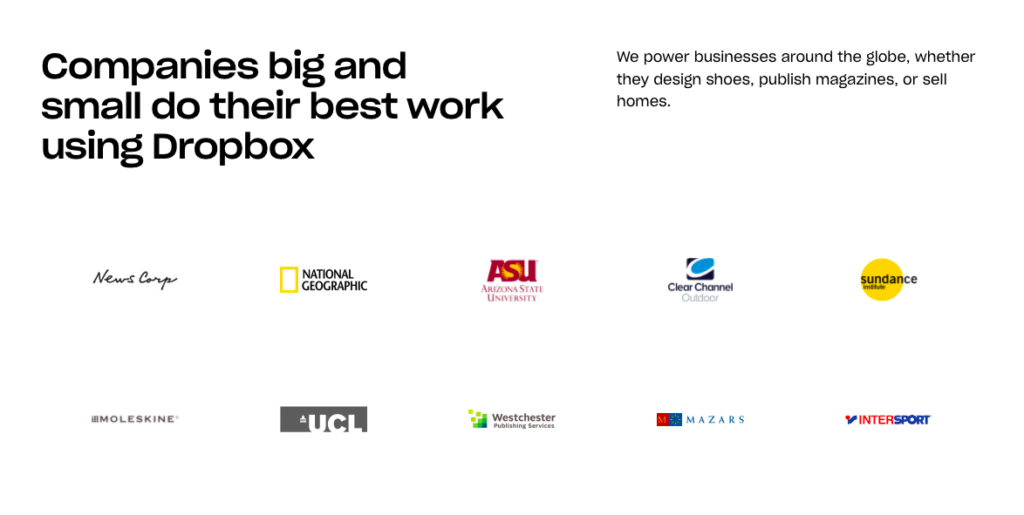
Dropbox Business Advanced Plan is another great option for anyone looking for unlimited cloud storage. It’s one of the pricier options on my list but offers a lot of great benefits.
Dropbox Pros
- #1 industry leader
- Easy to get started with and use
- Lightning-fast transfer speeds
- Great third-party integrations
Dropbox Cons
- Expensive (really)
- No zero-knowledge encryption
- Better Dropbox competitors are here
Dropbox’s Business Advanced Plan is its only plan with a listed price that offers unlimited storage (the Enterprise Plan does, too, but you need to get an individual price quote). The Business Advanced Plan costs $24 per user, per month. With a minimum of 3 users required upon sign-up, this means that it actually costs $75/month. If you choose to be billed yearly, you can save 20% (for a total price of $720).
One of Dropbox’s standout features is its speed. It comes in far ahead of the competition in terms of uploading large amounts of data in very small amounts of time, which means you’ll never waste time waiting for file uploads.
However, some users may have security concerns. Dropbox doesn’t offer zero-knowledge encryption, which means that – should they want to – the company can access your data.
If this isn’t a deal-breaker for you, then you can rest assured that Dropbox has other attractive security features, including 256-bit AES encryption and a remote-wipe feature that comes in handy if your device gets stolen.
It also comes with a lot of third-party integration features, including Google Docs, Slack, and Zoom.
Curious how Dropbox stacks up against the competition? Check out my Dropbox vs. Box comparison.
Dive into the world of unlimited storage with Dropbox's fast transfer speeds and intuitive interface. Integrate seamlessly with Google Docs, Slack, and Zoom. Start your journey with Dropbox Business Advanced Plan for $24/user/month.
4. OpenDrive Personal Plan
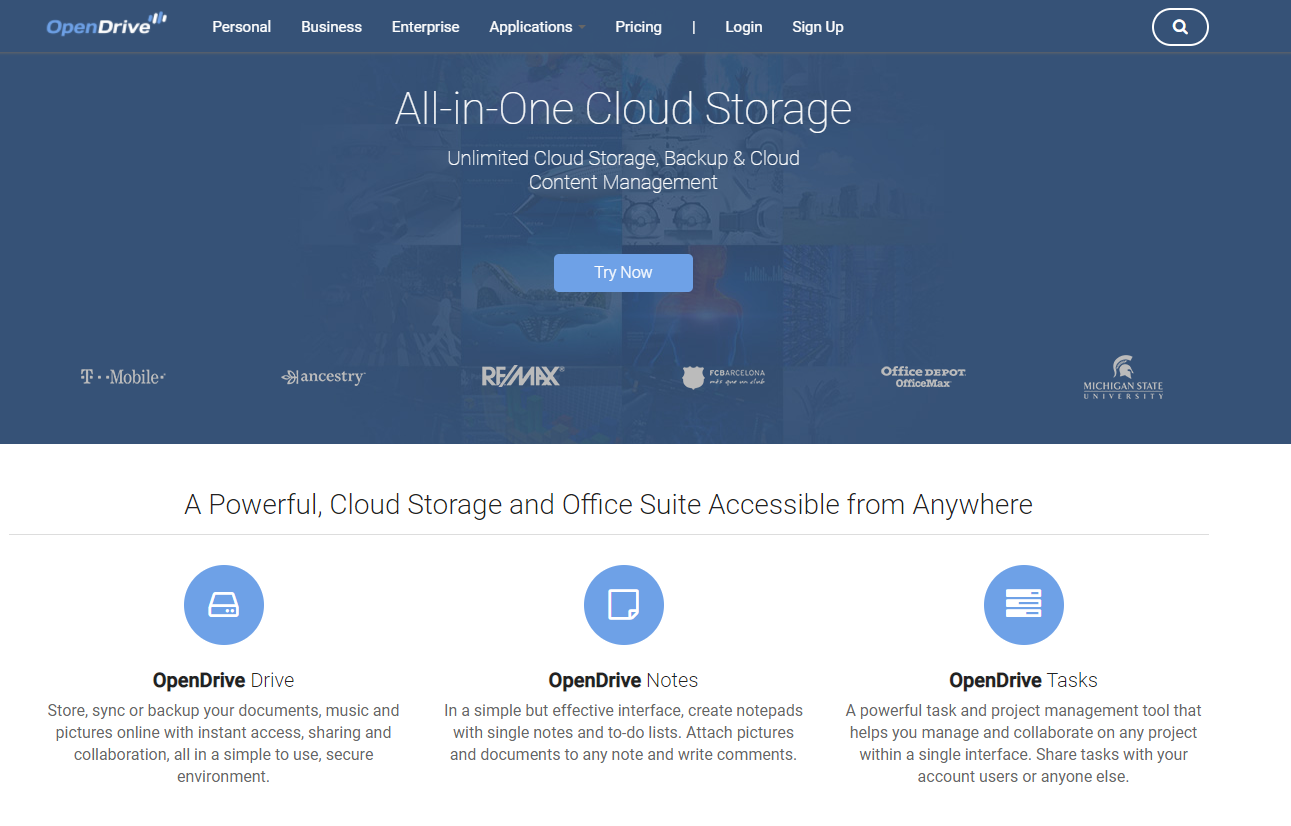
With clients ranging from T-Mobile to Michigan State University, it’s clear that OpenDrive is an appealing option for a wide range of businesses.
OpenDrive Pros
- Reasonably priced
- Built-in note-taking and task management features
- Document editing and collaboration tools
- Great security, including zero-knowledge encryption
OpenDrive Cons
- Relatively slow syncing and transfer speeds
- Clunky, awkward interface
With OpenDrive, you can edit files and collaborate on documents without needing to download them first.
OpenDrive is compatible with Linux, Windows, and Mac, and comes with built-in note-taking and task management tools, something you’ll rarely find in a cloud storage service.
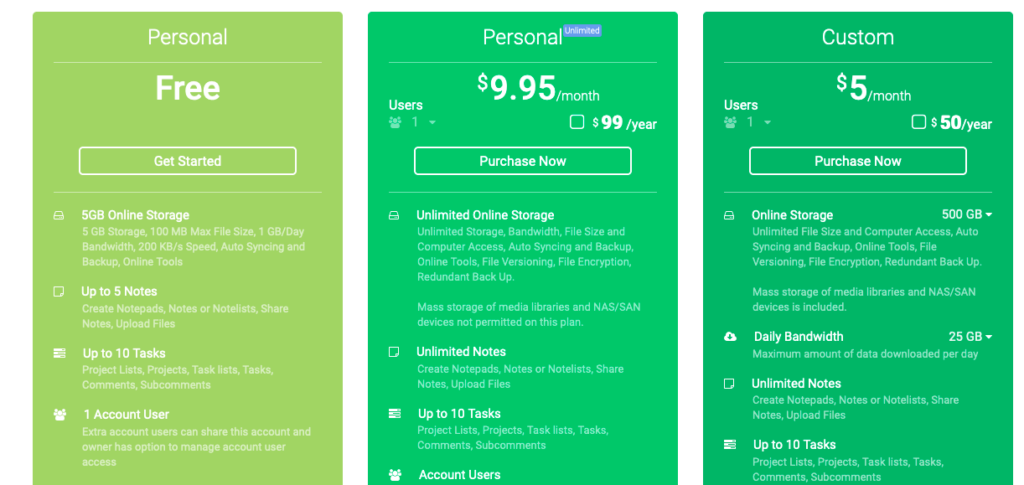
Another unusual feature is OpenDrive’s Personal Plan ($9.95/month), which also comes with unlimited storage. The Personal Plan even allows users to share a single account, which makes it a fantastic value for money.
For businesses, OpenDrive’s Business Unlimited Plan is $29.99/month ($299/year, with no annoying minimum user caveats). Their price tiers are straightforward (no hidden costs) and are among the more affordable options on this list.
However, OpenDrive struggles a bit when it comes to user experience. Its desktop interface isn’t the most user-friendly, and its relatively slow speeds of transfer put it at a disadvantage compared to its competitors. Nonetheless, if speed isn’t a deal-breaker for you, then OpenDrive could be an attractive solution to your cloud storage needs.
What’s the Best Unlimited Cloud Storage for Photos and Videos?
As increasingly high-quality smartphone cameras continue to turn all of us into amateur photographers, the demand for photo and video storage has never been higher.
There is a wide variety of photo and video cloud storage providers on the market today, and I’ve included a quick look at some of the best options here. For a more in-depth look, check out my comprehensive list of the best cloud storage for photos and videos.
1. Google Photos (Free Unlimited Storage for Pixel users)

With over 4 trillion photos stored in Google Photos and 28 billion more uploaded each week, there’s no doubt that Google Photos – now known as Google One – is a great tool for keeping your treasured memories safe.
Google Photos Pros
- Free unlimited cloud storage for photos and videos if you have a Pixel 5 phone or earlier.
- Automatically backs up all your photos and videos
- User-friendly interface
- Reasonably priced
Google Photos Cons
- Privacy issues
- Only unlimited for Google Pixel phone owners
Unfortunately, as of June 2021, Google has removed its unlimited storage option for everyone except users with a Google Pixel phone. If you have a Google Pixel, your storage is unlimited.
Otherwise, Google One offers 15 GB of free storage. Beyond the free level, prices start at a reasonable $1.99/month for 100 GB. The most storage Google currently offers at the individual level is 2 TB for $9.99/month.
Privacy is a big concern with Google because the company is known for using its user’s data for algorithmic marketing. There is no zero-knowledge encryption, which means the company can access anything you upload.
Despite this, Google Photos does have a lot of attractive features, including geo-tagging and facial recognition (these features can be disabled if you don’t want them) that allow you to organize your photos with little effort.
User-friendliness is Google’s main priority, and it’s easy to set up a shared account or share links so others can view your photos or files. And, if you have an Android, you can set your photos to automatically be uploaded to your Google account, which saves you from having to remember to back them up manually.
It doesn’t get easier than Google Photos, which is why it’s the favored option for millions of users.
2. Amazon Photos (Free Unlimited Cloud Storage for Prime Members)

With Amazon Photos, you can upload photos and videos, edit, and create albums to share with your friends and family. Amazon Photos is compatible with Amazon devices as well as your web browser and has apps for your desktop, iOS, or Android phone.
Amazon Photos Pros
- Prime members get free unlimited cloud storage for photos and videos
- User-friendly apps for iOS, Android, and desktop.
- Search photos by keyword
Amazon Photos Cons
- Some security concerns
- Initial photo sync takes a long time
Amazon Photos offers unlimited photo storage for Prime members, a great addition to the slew of other benefits that come with Prime membership. (Note: the free offer only applies to photos. If you want unlimited video storage, you have to pay extra.)
For Amazon customers who don’t have Prime membership, Amazon Photos offers 5 GB of free storage. If you want more (but don’t want to sign up for Prime), prices start at $1.99/month for 100 GB of storage.
Like Google, Amazon Photos offers an automatic backup feature across all its apps, so you’ll never have to worry about forgetting.
It’s also easy to share photos and albums via text or email, and the app even has a built-in messaging feature. Arguably one of its coolest features is the ability to search for photos by keyword: for example, you can look up the word ‘waterfall’ and the app will pull up all of your uploaded images of waterfalls. Say goodbye to endless scrolling for that one photo you’re looking for!
Amazon Photos’ privacy page claims that the company uses “physical, electronic, and procedural safeguards” to protect your privacy, but doesn’t go much into detail about what exactly those procedural safeguards are. They also use facial recognition software that can be disabled, but which some users might see as a security concern.
For anyone already using Amazon Prime, the unlimited photo storage option is a fantastic membership benefit. Even without a Prime account, Amazon Photos is a reasonably priced and very user-friendly option for storing your photos safely in the cloud.
3. Flickr Pro

Flickr is one of the oldest options on my list, and with over 100 million users worldwide, it has certainly stood the test of time.
Flickr Pros
- Super easy to use
- Unlimited storage for a low monthly cost
- One simple paid tier
- Tagging features
- Pro membership comes with extra perks for annual membership
Flickr Cons
- 1000 image limit for free account
- Can’t upload RAW images
While Flickr does offer a free tier, it limits users to 1000 photos. Considering how many pictures most of us snap every day, this doesn’t seem like that generous of an offer. If you want unlimited storage, you’re going to need to move up to Flickr’s paid tier, Flickr Pro.
You can choose to sign up monthly ($8.25) or annually ($6/month, billed as $72). If you sign up for the annual plan, you get access to awesome perks including two free months of Adobe Creative Cloud membership.

Flickr Pro comes with unlimited space and is compatible with iOS, Android, and web browsers on your PC. In terms of images, Flickr allows you to upload JPEG, PNG, and non-animated GIF files, but not RAW images, which might be a disappointment to professional photographers.
If this limitation doesn’t bother you, Flickr more than makes up for it with its added features. One of its coolest features is an uploading tool called AutoUploadr, which allows you to upload a photo collection from multiple different sources.
Overall, Flickr Pro is a great option for unlimited photo storage. It’s user-friendly and easy to sign up for, and the added benefits that come with annual membership are a great opportunity for budding photographers and professionals alike.
Google Drive / G Suite Business
Google Drive used to offer unlimited storage space, but unfortunately, this is no longer an option. If you signed up for a plan before June 1st, 2021, you still have access to unlimited storage space, but this option is not available for new sign-ups.
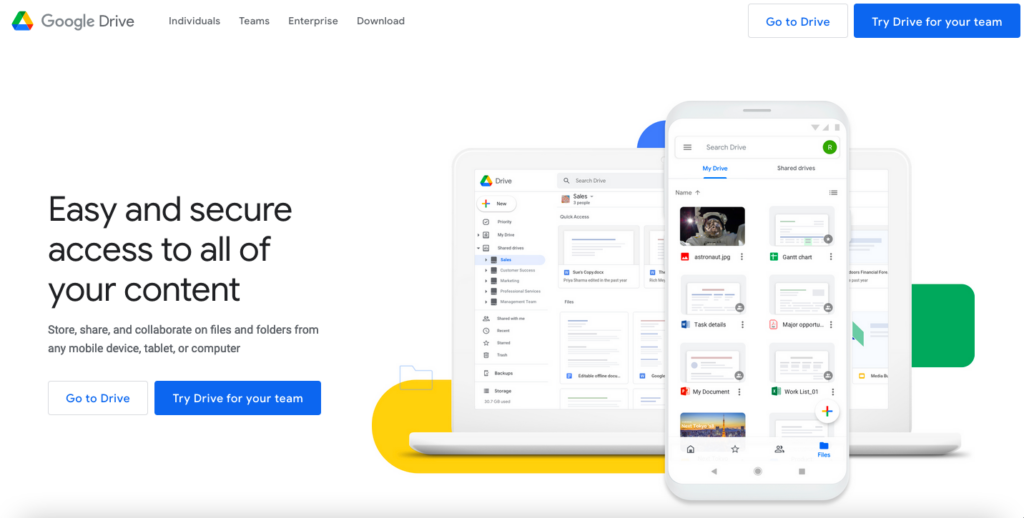
Google cited the need to keep pace with growing demand and to provide a consistently high quality of service to its customers as the reasons behind the decision.
The biggest storage option currently offered by Google Drive is 30 TB, which costs $300/month.
Worst Cloud Storage (Downright Terrible & Plagued With Privacy and Security Issues)
There are a lot of cloud storage services out there, and it can be hard to know which ones to trust with your data. Unfortunately, not all of them are created equal. Some of them are downright terrible and plagued with privacy and security issues, and you should avoid them at all costs. Here are two of the very worst cloud storage services out there:
1. JustCloud
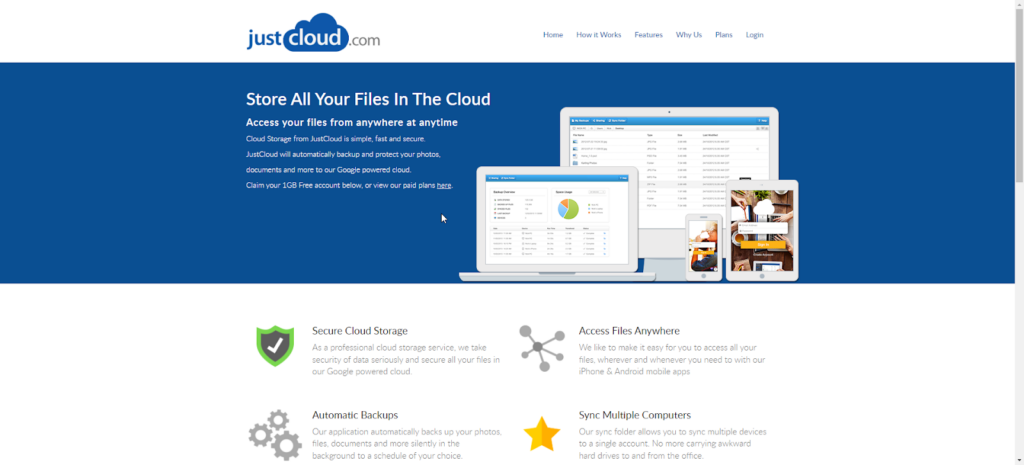
Compared to its cloud storage competitors, JustCloud’s pricing is just ridiculous. There’s no other cloud storage provider so lacking in features while possessing enough hubris to charge $10 a month for such a basic service that doesn’t even work half the time.
JustCloud sells a simple cloud storage service that allows you to back up your files to the cloud, and sync them between multiple devices. That’s it. Every other cloud storage service has something that differentiates it from its competitors, but JustCloud offers just storage and syncing.
One good thing about JustCloud is that it comes with apps for almost all operating systems including Windows, MacOS, Android, and iOS.
JustCloud’s sync for your computer is just terrible. It isn’t compatible with your operating system’s folder architecture. Unlike other cloud storage and sync solutions, with JustCloud, you will be spending a lot of time fixing syncing issues. With other providers, you just have to install their sync app once, and then you never have to touch it again.
Another thing I hated about the JustCloud app was that it doesn’t have the ability to upload folders directly. So, you have to create a folder in JustCloud’s terrible UI and then upload the files one by one. And if there are dozens of folders with dozens more inside them that you want to upload, you’re looking at spending at least half an hour just creating folders and uploading files manually.
If you think that JustCloud might be worth a try, just Google their name and you’ll see thousands of bad 1-star reviews plastered all over the internet. Some reviewers will tell you how their files were corrupted, others will tell you how bad the support was, and most are just complaining about the outrageously expensive pricing.
There are hundreds of reviews of JustCloud that complain about how many bugs this service has. This app has so many bugs you’d think it was coded by a school-going child rather than a team of software engineers at a registered company.
Look, I’m not saying there isn’t any use case where JustCloud might make the cut, but there’s none that I can think of for myself.
I’ve tried and tested almost all of the popular cloud storage services both free and paid. Some of those were really bad. But there’s still no way I can ever picture myself using JustCloud. It just doesn’t offer all the features I need in a cloud storage service for it to be a viable option for me. Not only that, the pricing is way too expensive when compared to other similar services.
2. FlipDrive

FlipDrive’s pricing plans might not be the most expensive, but they are up there. They offer only 1 TB of storage for $10 a month. Their competitors offer twice as much space and dozens of useful features for this price.
If you look around a little, you can easily find a cloud storage service that has more features, better security, better customer support, has apps for all your devices, and is built with professionals in mind. And you don’t have to look far!
I love rooting for the underdog. I always recommend tools built by smaller teams and startups. But I don’t think I can recommend FlipDrive to anyone. It doesn’t have anything that makes it stand out. Other than, of course, all the missing features.
For one, there’s no desktop app for macOS devices. If you’re on macOS, you can upload and download your files to FlipDrive using the web application, but there’s no automatic file syncing for you!
Another reason why I don’t like FlipDrive is because there is no file versioning. This is pretty important to me professionally and is a deal-breaker. If you make a change to a file and upload the new version on FlipDrive, there’s no way to go back to the last version.
Other cloud storage providers offer file versioning for free. You can make changes to your files and then revert back to an old version if you aren’t happy with the changes. It’s like undo and redo for files. But FlipDrive doesn’t even offer it on the paid plans.
Another deterrent is security. I don’t think FlipDrive cares about security at all. Whatever cloud storage service you choose, make sure it has 2-Factor Authentication; and enable it! It protects hackers from getting access to your account.
With 2FA, even if a hacker somehow gets access to your password, they can’t log into your account without the one-time password that is sent to your 2FA-linked device (your phone most likely). FlipDrive doesn’t even have 2-Factor Authentication. It also doesn’t offer Zero-knowledge privacy, which is common with most other cloud storage services.
I recommend cloud storage services based on their best use case. For example, if you run an online business, I recommend you go with Dropbox or Google Drive or something similar with best-in-class team-sharing features.
If you are someone who deeply cares about privacy, you’ll want to go for a service that has end-to-end encryption such as Sync.com or Icedrive. But I can’t think of a single real-world use case where I would recommend FlipDrive. If you want terrible (almost non-existent) customer support, no file versioning, and buggy user interfaces, then I might recommend FlipDrive.
If you are thinking of giving FlipDrive a try, I recommend you try some other cloud storage service. It’s more expensive than most of their competitors while offering almost none of the features their competitors offer. It’s buggy as hell and doesn’t have an app for macOS.
If you are into privacy and security, you won’t find any here. Also, the support is terrible as it is almost non-existent. Before you make the mistake of purchasing a premium plan, just try their free plan to see how terrible it is.
How We Test & Review Cloud Storage: Our Methodology
Choosing the right cloud storage isn’t just about following trends; it’s about finding what genuinely works for you. Here’s our hands-on, no-nonsense methodology for reviewing cloud storage services:
Signing Up Ourselves
- First-Hand Experience: We create our own accounts, going through the same process you would to understand each service’s setup and beginner friendliness.
Performance Testing: The Nitty-Gritty
- Upload/Download Speeds: We test these in various conditions to evaluate real-world performance.
- File Sharing Speeds: We assess how quickly and efficiently each service shares files between users, an often overlooked but crucial aspect.
- Handling Different File Types: We upload and download diverse file types and sizes to gauge service versatility.
Customer Support: Real-World Interaction
- Testing Response and Effectiveness: We engage with customer support, posing real issues to evaluate their problem-solving capabilities, and the time it takes to get a reply.
Security: Delving Deeper
- Encryption and Data Protection: We examine their use of encryption, focusing on client-side options for enhanced security.
- Privacy Policies: Our analysis includes reviewing their privacy practices, especially regarding data logging.
- Data Recovery Options: We test how effective their recovery features are in the event of data loss.
Cost Analysis: Value for Money
- Pricing Structure: We compare the cost against the features offered, evaluating both monthly and annual plans.
- Lifetime Cloud Storage Deals: We specifically look for and assess the value of lifetime storage options, a significant factor for long-term planning.
- Evaluating Free Storage: We explore the viability and limitations of free storage offerings, understanding their role in the overall value proposition.
Feature Deep-Dive: Uncovering Extras
- Unique Features: We look for features that set each service apart, focusing on functionality and user benefits.
- Compatibility and Integration: How well does the service integrate with different platforms and ecosystems?
- Exploring Free Storage Options: We evaluate the quality and limitations of their free storage offerings.
User Experience: Practical Usability
- Interface and Navigation: We delve into how intuitive and user-friendly their interfaces are.
- Device Accessibility: We test on various devices to assess accessibility and functionality.
Learn more about our review methodology here.


